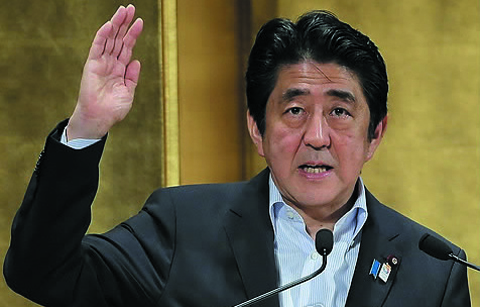美日동맹 강화로 미국의 환심 사고, 동북아 주변국과는 마찰 예상

아베 신조(安倍晋三) 일본 총리가 4월 29일 미 의회에서 상하원 합동연설을 할 때 언급할 이중적인 말들을 주의하라.
아베 총리의 외할아버지인 기시 노부스케(佐藤信介)가 일본 총리 재임 시절인 1957년 미 하원에서 연설한 적은 있지만, 미국 상하원 합동연설을 하는 일본 총리는 아베가 처음이다.
외손자가 외할아버지의 발자취를 따라간다고 볼 때 외할아버지 기시가 일본의 전시(戰時) 각료로 과거 전쟁 범죄자로 비난받았던 것은 주목할 만하다.
기시 전(前) 총리는 재판 없이 풀려났고 일본이 강대국으로 재기하는 꿈을 가진 보수적 민족주의자들을 이끌었다.
신(新)민족주의적 보수주의자인 아베 총리는 외할아버지 기시와, 기시의 동생으로 일본 총리를 세 차례나 역임하며 미국과 돈독한 관계를 맺어 미군이 태평양 전쟁에서 피 흘리며 점령한 오키나와를 27년 만에 돌려받은 사토 에이사쿠(佐藤榮作)의 전통을 따라가고 있다.
아베 총리가 무슨 말을 하든 그 안에는 일본이 약 70년 전인 1945년 8월에 항복하기 전까지 자행했던 군국주의와 제국주의에 대한 역사적인 기록에 대한 뉘우침의 모양이 담겨 있어야 할 것이다.
하지만 일본이 한반도를 식민지로 삼은 것, 위성국인 만주국을 세운 것, 동남아 대부분과 중국 대부분 지역을 정복한 것 등 당시 역사 전체에 대해 진심의 ‘사과’를 할 것이라고는 누구도 기대하지 않는다.
아베가 전쟁 당시 ‘위안부’라는 이름으로 강제로 일본군의 성노리개가 되게 한 20여만 명의 한국 여성을 비롯, 많은 젊은 여성들의 비운에 대한 심심한 우려를 표명할 가능성은 없다.
진심어린 뉘우침의 표현을 회피하면서 아베는 한국전쟁으로 한반도가 분단된 이후 오랫동안 한국인들 가운데 곪아터지고 있는 아픔에 불을 붙이는 의도하지 않았던 우를 범할 가능성이 있다.
하지만 아베의 우파적인 시각은 미국 양당 의원들의 높은 지지를 받을 것이 분명하다. 미 국방부나 국가안보회의(NSC) 등 미국의 군사 전략가들은 아베가 미일(美日) 동맹을 강화하길 원한다고 보고 있고, 이를 통해 오키나와에 새로운 미 해병대 기지를 건설하고 중국에 확고하게 맞서는 것을 기대하고 있다.
私的으로 독도 문제 언급 가능성
아베는 만일 센카쿠 열도(중국명 댜오위다오·釣魚島)를 두고 무력충돌이 발생하면 미국이 일본 편을 들 것이라는 확신이 필요하다. 이 섬은 오키나와 현 소속의 류큐 섬 남쪽 끝에 있는 이사카기보다 타이완에 조금 더 가깝다.
하지만 일본은 이 섬을 기준으로 20㎞ 영해선 안으로 계속 침입해 오는 중국 어선과 ‘연구용’ 선박들에 대해 단호하게 맞서고 있다.
일본이 동중국해에서 미국의 지원을 필요로 하는 것은 일본어로 다케시마로 불리는 독도에 대한 영유권 주장을 위해서다.
아베가 미 상하원 합동연설에서 독도 문제를 제기할 것으로 생각되지는 않는다. 하지만 사적(私的)으로 미국 관리들과 이에 대해 논의할 가능성은 높다.
미국은 독도 이슈가 완전히 사라지기를 바란다. 미국은 워싱턴에서 아베에게 이 메시지를 전달하면서 동시에 위안부 문제와 일본 제국주의 역사에 대해 매우 편향된 시각을 가르치거나 일본이 자행한 만행들에 대한 언급 없이 역사를 얼버무리고 있는 일본 교과서 문제에 대한 한국인들의 분노를 달래주라고 부탁할 것이 분명하다.
 |
| ▲ 오는 4월 29일 미 의회 상하원 합동연설을 앞두고 있는 일본의 아베 총리. 과연 그는 일본의 과거사에 대한 반성을 할 것인지? |
미국 지도자들은 독도에 대한 일본의 영유권 주장을 포기하고 한국과 화해하라고 아베를 설득하고 싶어 한다. 하지만 아베가 쉽게 그렇게 하지 않을 것이라는 사실을 잘 알고 있다.
아베는 더글러스 맥아더 장군이 일본에 부과한 전후(戰後) 헌법 9조를 제거하면서 일본이 세계적인 경제 강국으로 부상하는 것에 대한 내용을 개진할 가능성이 높다.
TPP에 대한 지지 요청
아베의 임무는 미일 동맹, 중국과 북한에 대한 군사적 우려가 전부가 아니다. 그는 한국은 포함되어 있지 않지만 미국이 아시안 국가들을 대상으로 추진하는 환태평양경제동반자 협정(TPP)에 대한 최소한의 지지를 표명하고 싶어 한다.
일본은 TPP의 강력한 지지자로 중국이 추진하는 아시아인프라투자은행(AIIB)의 창립 멤버가 되는 기회를 거절했다.
한국뿐만 아니라 유럽 국가들이 이 은행에 가입하기로 하면서 모욕을 당한 미국에게 일본의 이러한 입장은 의미가 매우 큰 것이다.
일본의 이 결정으로 미국은 일본과의 교역에서 통상적인 무역장벽과 중국, 한국과의 교역에서도 이슈인 무역 적자를 두고 일본을 압박하지 않을 것이다. 
Watch out for some serious double-talk when Japan's Prime Minister Shinzo Abe addresses a joint session of the U.S. Congress on Friday, April 29.
He'll be the first Japanese leader ever to address both the Senate and the House of Representatives though his grandfather, Nobusuke Kishi while prime minister addressed the lower house in 1957.
The phenomenon of the grandson following in the footsteps of his grandfather is even more significant considering that Kishi as a former member of Japan's war-time cabinet was accused of war crimes.
Released without ever facing trial, Kishi went on to lead Japan as a conservative nationalist dedicated to Japan's revival as a great power.
As a neo-nationalist conservative, Abe follows in the tradition of both Kishi and Kishi's younger brother, Eisaku Sato, who in three terms as prime minister formed extraordinarily close relations with the U.S. while engineering the "reversion" of Okinawa from U.S. to Japanese rule in 1972, 27 years after U.S. forces conquered Japanese forces on Okinawa in the bloodiest battle of the war in the Pacific.
Abe in whatever he says will have to include some semblance of contrition for Japan's record of militarism and imperialism until the Japanese surrender nearly 70 years ago, in August 1945, but no one should expect a sincere "apology" for the entire record, including the takeover of the Korean peninsula, the establishment of the satellite state of Manchukuo and the conquest of much of the rest of China as well as most of Southeast Asia.
Nor is there any chance that Abe will show any abiding concerns about the fates of thousands of young women, notably 200,000 Koreans, compelled to serve Japan's imperial forces as "comfort women" during the war.
By avoiding real signs of remorse, it's possible that Abe will inadvertently be pouring fuel onto the flames of the bitterness that festers among Koreans so long after the war ended in the division of the Korean peninsula.
Abe's rightist outlook, though, is sure to get a highly approving reception from member of both major U.S. political parties. U.S. military planners, whether at the Pentagon or the National Security Council, see him as wanting to strengthen the U.S.-Japan alliance while building a new base for U.S. marines in Okinawa and standing firm against China.
He needs to be confident the U.S. will take Japan's side in the event of an armed showdown over the Senkaku Islands, known as the Diaoyu to the Chinese.
The islands are slightly closer to Taiwan than they are to Ishigaki, almost at the southern end of the Ryukyu Island chain that's all part of Okinawa prefecture, but Japan is standing firm against daily harassment by Chinese fishing boats and "research" vessels that intrude regularly inside the territorial limits of 20 kilometers.
Japan's need for U.S. support in the East China sea supersedes its claims to Dokdo, Takeshima in Japaese.
It's unthinkable that Abe would raise the Dokdo question jn his address to the Congress, but he might have to discuss it privately with American officials. The U.S. would like the whole Dokdo/Takeshia issue to disappear.
The Americans are sure to convey that message to Abe in Washington while also imploring him to try to placate Korean outrage over both comfort women and Japanese textbooks, which continue to teach a highly biased view of Japan's imperial record or else simply to gloss over the history without mentioning unpleasant details. U.S. leaders would like nothing better than to persuade Abe to reconcile with Korea over these issues, abandoning Japan's claim Dokdo, but they're sophisticated enough to know that Abe is not going to back down.
Much more likely, he will subtly advance the case for Japan's emergence as a global economic power, doing way with Article Nine of the post-war constitution, foisted on Japan by General Douglas MacArthur.
Abe's mission, though, is not all about the U.S.-Japan alliance and military concerns about China and North Korea. He also wants to put on the appearance at least of enthusiasm for the Trans-Pacific Partnership, the U.S.-formed consortium of Asian countries, not yet including Korea. As the strongest U.S. partner in TPP, Japan has turned down the opportunity to become a founding member of China's Asian Infrastructure Investment Bank.
That position means a great deal to the U.S., to which the decision of European countries as well as Korea to join the bank has been humiliating. The Japanese decision no doubt means the U.S. will not pressure Japan about the usual trade barriers and the U.S. trade deficit, also a huge issue in relations with China and Korea. 
번역 이상민 미래한국 기자 proactive09@gmail.com
외부게재시 개인은 출처와 링크를 밝혀주시고, 언론사는 전문게재의 경우 본사와 협의 바랍니다.


